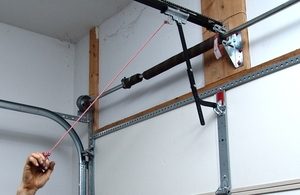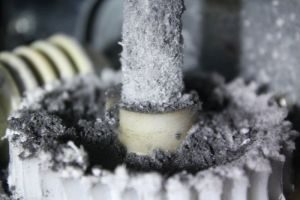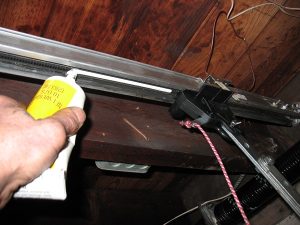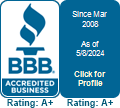Posted July 7th, 2017 at 3:41 pm by Sales Team
Ultimately, every garage door opener will make noise. It’s impossible to get something as large and as heavy as a garage door to be whisper quiet. In earlier decades, it didn’t matter because many garages were detached, but in the last 20-25 years, most single-family homes have been built with attached garages. As a result, bedrooms are often above the garage, and living rooms are beside the garage separated with just a wall. Each week we get a number of requests from customers who would like to reduce the noise coming from their garage doors.

To get rid of the noise, first, determine whether it is coming from the door or the opener. Disengage the opener from the door and then open and close the door manually. If you don’t hear the noise when doing this, the opener is the source of the noise. Otherwise, the noise is probably coming from the door.
Here are a few suggestions for quieting your door.
Lubricating the Door
One easy way to eliminate noise from the door is to lubricate all the moving parts. End bearings, center bearings, springs, hinges, and rollers can all make noise. We recommend using a spray lubricant designed for garage doors, 3-IN-ONE® oil, or non-detergent motor oil such as 10W30 or 5W30. Do not use WD-40® as that acts more like a cleaner, and it actually removes the existing lubrication.
Also, if you have dry torsion springs, do not lubricate the last five coils on each end. If oil gets under the coils, the spring can come loose, causing it to unwind and the door to fall if it is open. This tutorial should help:
Installing Nylon Rollers
Another way to quiet the door is to replace the existing steel rollers with nylon rollers. Most doors ship from the factory with steel rollers. The main source of noise with these is steel wheels rolling on the steel tracks. This noise can be reduced by adding a small amount of oil on the horizontal tracks and lubricating the wheels of the rollers. However, ultimately steel on steel will make some noise.
The alternative is to install nylon rollers. These can be found on our rollers page. The nylon rollers are more expensive than steel rollers, but reducing the noise may be worth the higher cost. We often get questions regarding the durability of nylon versus steel rollers. Our 11-ball nylon rollers last as long as the standard 10-ball steel rollers, but beware of cheap plastic rollers. They appear to be similar to the higher quality nylon rollers, but many do not have ball bearings, and they wear down quickly. Many do have the ball bearing rollers, but they fall apart after only a few years. This tutorial should be helpful if you would like to install new nylon rollers to quiet your door:
Reducing Opener Noise
The final potential source of noise is the garage door opener. Whether new or old, there is always a certain amount of hum and vibration from the motor. This noise is especially loud above the garage, as the vibration travels up the mounting angle and through the ceiling to the floor above. The best solution we’ve found is to hang the opener from the angle with bungee cords. You want to use shorter, stronger bungee cords to make sure there isn’t too much stretch. Ideally, you should use two bungee cords, one to hang the opener, and then one going around the bottom of the opener body in order to support it and eliminate any side to side movement.

It’s also possible for the opener to create higher pitched squeaks or grinding noises, as in this Sears opener with a worn bushing. Two of the more common noises include stripped gears in Chamberlain / Sears Craftsman / Liftmaster openers.

We also see a lot of stripped trolleys on Genie screw drive openers. Other causes include a lack of grease on the internal gears and bushings, a lack of oil on the chain if you have a chain drive opener or lack of grease on a screw-drive opener. Occasionally, stripped gears are the result of half-baked torsion springs. For any sort of squeaking or grinding noise, make sure you check the opener for proper lubrication and be sure to use only the grease recommended by the manufacturer.
This entry was filed under Customer Input, Technical Support. You can follow any responses to this entry through the RSS 2.0 feed. You can skip to the end and leave a response. Pinging is currently not allowed.


Leave a Reply